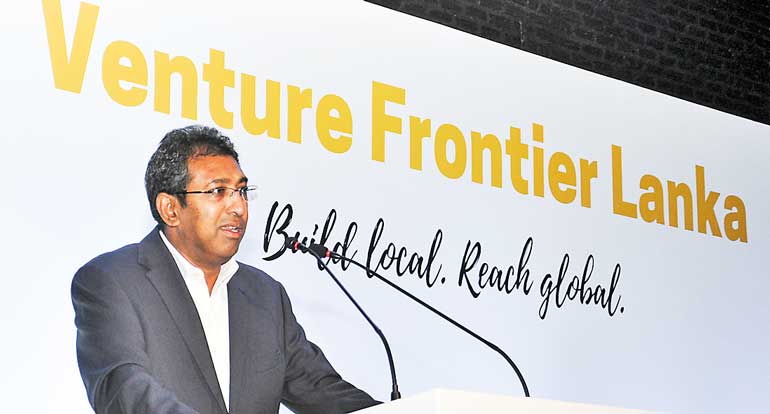Sunday Feb 22, 2026
Sunday Feb 22, 2026
Thursday, 15 March 2018 00:54 - - {{hitsCtrl.values.hits}}

By Charumini de Silva
National Policies and Economic Affairs State Minister Dr. Harsha de Silva yesterday (14 March) said the Government will soon unveil a new Innovation and Entrepreneurship Strategy 2018 – 2022, while insisting that many changes will be implemented by the end of the month to strive to have a better doing-business climate in Sri Lanka.
Echoing that entrepreneurship is crucial for a country’s prosperity at the launch of Sri Lanka’s first integrated entrepreneurship platform, Venture Frontier Lanka, in Colombo yesterday, Dr. de Silva however emphasised that it was also critical for the Government to deliver on consistent policies to encourage entrepreneurship, which will lead the country towards a well-planned path to development.
“Government vision for 2025 is to create a prosperous nation and build a knowledge-based, highly competitive social market economy. To achieve this, we need to create high-paying jobs and we need entrepreneurs and start-up businesses.
Entrepreneurs who set up SMEs are engines of growth. Start-ups are disruptive, innovative, and dynamic, while jobs that will be created here are of high value, high skill, and high pay,” he said.
The Innovation and Entrepreneurship Strategy 2018 – 2022 key objectives revolve around key factors that include high skill and capital-intensive exports production, building the ecosystem for scaling growth-oriented start-ups, and modernising and re-aligning the R&D sector.
“The strategy wants to support SMEs in developing higher value-added products and services for exports. We want to improve the business environment, supporting early stage financing and reviewing the institutional framework. One such step would be allowing limited liability partnerships and encouraging angel financing. We also need to increase R&D spending to at least 0.8% of GDP, with at least 50% coming from the private sector,” he pointed out.
According to data, only 2.8% or around 230,000 of the working population in Sri Lanka are employers or business owners, compared to 27.5% in Thailand, 19.6% in Vietnam, 16.9% in Brazil, 15.3% in Indonesia, 11.6% in Bangladesh and 7.5% in China. He said considering the population of these countries, the level of entrepreneurial activity in these economies were staggering.
“The data does not paint a rosy picture about entrepreneurship in Sri Lanka. I listen to people from all over this nation, and I know that they have the raw skills and revolutionary ideas that are the base for successful entrepreneurship, but that is not enough. They (entrepreneurs) need training, mentoring, guidance on how to do their market research, structure their project, where and how to approach funders, market their products and need innovative financing,” Dr. de Silva said.
He asserted that the start-up business model requires banks and finance companies to adopt a different attitude to financing, and requires newer models like venture capital and angel financing.
Dr. de Silva assured that the Government was taking steps to directly address some of the major stumbling blocks, such as lack of financing and lack of mentoring through.
It was pointed out that the ‘Enterprise Sri Lanka’ program will address the lack of financing for start-ups in Sri Lanka, by creating 15 different subsidised credit facilities, amounting to a total allocation of Rs. 60 billion to be disbursed through State and private banks.
“We don’t want to have another development bank, but through the new Development Banking Unit will have another Rs. 20 billion, leveraged hopefully to a Rs. 100 billion,” the State Minister emphasised.
He also said Venture Frontier Lanka will be Sri Lanka›s first integrated entrepreneurship platform, dedicated to the development of early stage start-ups throughout the entire venture life cycle, from idea to venture stage. “This, we hope, will fulfil an immense need for mentoring and network building between start-ups, larger companies, supply chains and markets.”
Noting that it’s amazing to see the number of young people looking for ‘safe’ and ‘risk-free’ jobs in the public sector, he called on to change this mind-set. “The Government doesn’t create wealth, it is you who create wealth, and it is you who can make Sri Lanka prosperous by prospering yourselves. We need to produce job creators, not job requestors,” he stressed.
Dr. de Silva further pointed out that the Government will introduce education reforms that will encourage innovation and risk-taking. “In our new 13 years of education program, we are introducing 26 applied subjects that students could choose to study, ranging from event management to construction studies, to textile apparel studies, to software development. We want to use our schools to change mind-sets, to promote and celebrate entrepreneurs across the country,” he emphasised.
Acknowledging that our society shuns failure, he noted that there was so much to learn from failure. “Failure is not necessarily a bad thing – it is a badge of honour if anything! Most start-ups will fail, but risk is part of learning, risk is what builds resilience, risk is what enables success.”
He expressed confidence on Venture Frontier Lanka and said: “I am sure the young and dynamic group who are entrepreneurs themselves will take the lead in showing us why courageous, well-planned risk taking is our path to development.”